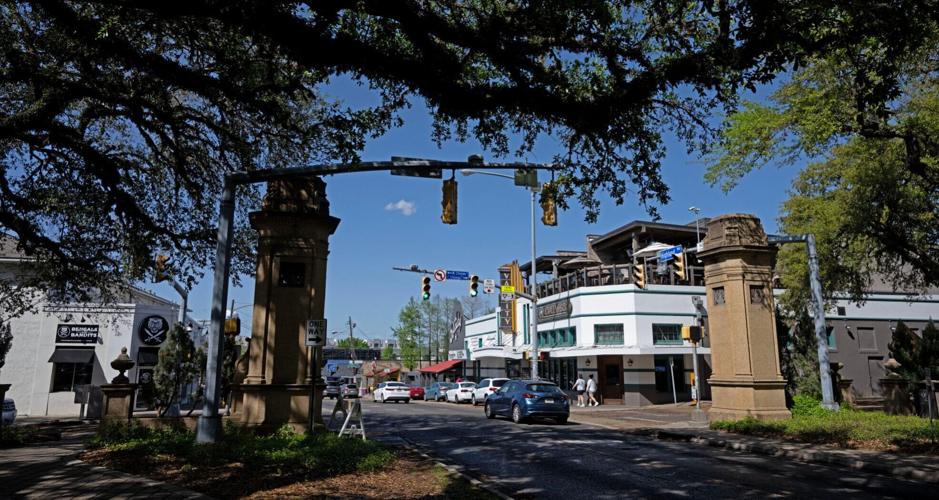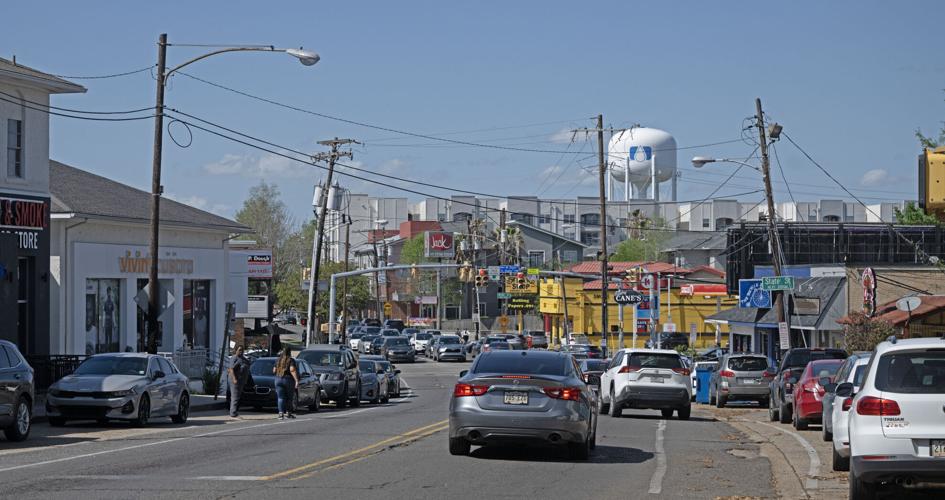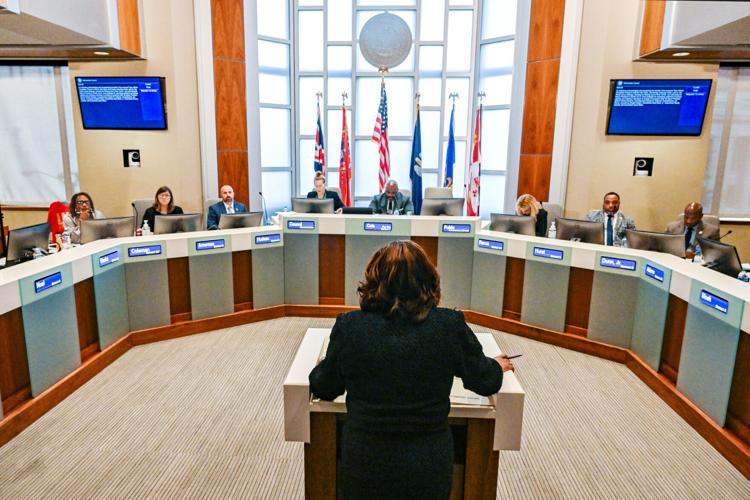As LSU officials move forward on a proposal to build a $400 million new arena on campus, they plan to use a law passed by the Legislature last year to create a special taxing district surrounding the university —?one with the power to give public dollars to private developers.
The newly formed LSU economic development district, created by Sen. Cleo Fields, D-Baton Rouge, spans from Brightside Drive, through campus and all the way to the doorsteps of Knock Knock Children’s Museum near Dalrymple Drive. It will collect sales taxes from businesses on and around LSU’s campus, including The Chimes on Highland Road and Walk-On’s?on Burbank Drive.

Those sales taxes —?most of which, officials say, will be generated on LSU's campus —?could then be funneled into projects in the district, including to a private developer to help offset the cost of the arena, which will be privately built and managed.
According to Charles Landry, an attorney who helped draft the legislation and is now shepherding the arena project, neither the city-parish government nor local voters will have a say in creating new taxes in the district.
Instead, a board of commissioners appointed by LSU’s president will be responsible for creating sales taxes of up to 2% and deciding how to distribute the revenue generated.
Several members of the Baton Rouge Metro Council, which?voted earlier this month?in favor of the LSU arena deal, have said in recent interviews that they are uncertain how the new taxing district would work. Council members voted to support the project?— and to?restrict the size of concerts at the Raising Cane’s River Center downtown, which the city-parish owns, to prevent competition with the on-campus arena.
Council members will not have control over any new sales tax from the economic development district. But they are likely to be asked to chip in money from other city-parish taxes, officials have said.
Taxpayers in general would not get to vote directly on a tax for the LSU arena, as no registered voters live within the district’s boundaries.
The lack of voter approval is yet another concern for some skeptics of the LSU arena project, few?details?of which have been shared with the public despite the likely use of public land and public money.
The Tiger Athletic Foundation, a private entity that raises money for LSU sports, has asked two unnamed developers to submit proposals to build the arena, with the aim of making a choice by June. LSU officials say the developer is expected to foot most of the cost of the arena, which they hope will open in about five years.
“Any time you’re dealing with taxes, but the person paying the tax doesn’t have the privilege of knowing the details — everything about it sounds like we’re going back to before there was law, constitution, fairness and equity,” said?Councilwoman Chauna Banks, the sole dissenter on the vote to support the arena deal. “I’ve just never seen anything like it.”
LSU attorneys have denied public records requests from The Advocate | The Times-Picayune seeking details about the solicitation of proposals and the two developers in the running for the project. The lawyers said project documents belong to TAF, not the university. Landry, the real estate attorney, has also said the developer will not solicit public bids for the arena's construction.
Landry and LSU officials insist it’s too early in the project timeline to disclose specific plans, as they are still waiting to receive proposals from the developers. They also stress they have received public input by meeting with the mayor and local organizations like the Baton Rouge Area Foundation, as well as through the council meeting earlier this month. Landry has often worked closely with BRAF on real estate deals around Baton Rouge.

Attorney Charles A. Landry, representing LSU, speaks during the Baton Rouge Metro Council meeting at city hall on Wednesday, March 13, 2024.
Landry said the “whole project, starting from the ground up” also will need approval from the LSU Board of Supervisors before it can move forward.
“How in the world am I, as someone involved in this project, to try to figure out what Ms. Doris Smith on Plank Road thinks about the LSU arena?” Landry said. “I want to make a very important point here. There has been enormous public input in this process. Enormous.”
Three years in the making?
Economic development districts like LSU’s are typically used to incentivize growth in moribund areas, allowing for the creation of new sales, hospitality or property taxes to help spur activity. They can also be used to help pay for infrastructure projects like roads and lighting around a development.
East Baton Rouge Parish has at least 21 economic development districts, with the oldest dating to 1987, approved through city ordinances, resolutions and state laws, according to Open Data BR, a city-parish government website. They were a key tool in revitalizing downtown Baton Rouge with new hotels?and have also supported?grocery stores in north?Baton Rouge and revitalizing infrastructure surrounding the Amazon Fulfillment Center.
In most cases where the Legislature created a district in East Baton Rouge Parish, at least one board member was appointed by the mayor-president, the council or both.
“Usually when there’s an EDD, they allow multiple factions of stakeholders to have input,” Banks said. “It’s never where one person … they’re the sole person choosing the board. None of it sounds right and none of it sounds good."

Drivers and pedestrians navigate the area around Highland Road and Chimes Street Tuesday afternoon, March 26, 2024, at the North Gates to LSU in Baton Rouge, La.
The LSU district’s board, which has yet to be formed, will be made up of LSU’s president and four of his appointees, two of which must represent businesses within the district. Together, the board is tasked with developing “public improvement projects” for LSU’s benefit, either directly through the university or through "private foundations or nonprofit corporations affiliated" with LSU.
They must hold a public hearing in order to levy new taxes.
During a legislative hearing last year, LSU President William Tate IV told lawmakers the district had been in the works for three years but did not mention the possibility of using it for a new arena.
Landry, who sat next to Tate during testimony, said he was volunteering to help create economic development districts at LSU and Southern University, “as well as a significant master plan of what types of projects could be funded through this economic development district.”
Residential areas excluded from district
Fields said in a recent interview that he intentionally carved out residential areas, including student housing, from the district to remove the need for a local vote.
Landry said LSU is confirming with the registrar of voters that no residents live within the economic development district.?
“I want to make it very clear this isn’t an issue of any effort on any part on anybody trying to go around the local governing authority,” he said, adding that the new?board should be named in the next 30 days.

The PMAC sits empty before LSU takes the court for their practice for the first round of the NCAA tournament on Thursday, March 21, 2024 in Baton Rouge, Louisiana.
Fields said financing an LSU arena was “not the focus of the legislation,” which was broadly aimed at incentivizing business growth around Baton Rouge’s universities and improving their entrances. He added that he wanted to carve out voters so university leaders could decide how best to improve their campuses.
Fields added he hadn’t discussed the LSU arena with Landry, and that he hadn’t thought about LSU using the district for an arena.
Landry has said the arena is exactly the type of project the economic development district envisioned.
“It's in an EDD, and the EDD was created for this specific purpose and everybody who is involved in this project is very much aware that the EDD was created for the purpose and other purposes for the benefit of LSU to support this project,” Landry said. “There are a lot of projects LSU is, right at this point, considering to use funding from the EDD —?from security and lighting and all kinds of great things —?not nearly just this arena, but the arena is going to have the benefit of being in this economic development district.”
Landry has said that the developer will likely request separate public funding from the council in the future.
“This group, within the next 12 to 18 months, could expect the final developer to come forward and say, ‘Listen, this is a greenfield. You don’t have any revenue coming from this site,” Landry told Metro Council members on March 13 before they voted to support the arena deal. “Would you consider allowing us to have 1 cent of your 2 cents of undedicated tax for that purpose?’”
LSU officials have said the arena would be privately financed and wouldn’t cost taxpayers any money — sentiment they still stand behind.
"I would say that the funding will be determined by the developer, but we at this time don't anticipate existing public dollars being used," LSU spokesman Cody Worsham said Thursday.
The potential use of a new sales tax to help finance the arena has led to others calling for more transparency, including the Public Affairs Research Council, which has said that the public has the right to know how its money would be used in such a deal.
Several council members said they did not have enough information on LSU’s economic development district to comment on it.
“I would say generally folks are expressing to me they’re very much in favor of an arena coming to our community, they recognize the economic benefits, they recognize the benefits for the future of Baton Rouge,” Councilman Rowdy Gaudet said. “I’m going to be very cognizant of how any sort of deal is structured, how much public dollars go into it and that ultimately it still continues to benefit the public.”








